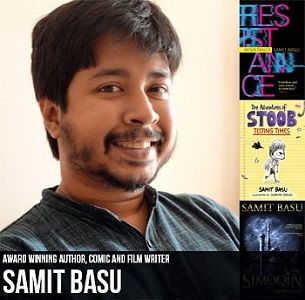Interview with dark fantasy author, Kaaron Warren
Our next featured guest interview is with award-winning dark fantasy writer, Kaaron Warren.
Kaaron has been publishing ground-breaking fiction for over twenty years. Her novels and short stories have won over 20 awards, from local literary to international genre. She writes horror steeped in awful reality, with ghosts, hauntings, guilt, loss, love, crime, punishment and a lack of hope.
She has just released a new novella, Into Bones Like Oil, a gothic-inspired ghost story and we are happy to participate in the blog tour.
AUTHOR LINKS: Website | Twitter | Goodreads
What inspires you to write horror and science fiction?
I’ve always been drawn to stories that look at what lies beneath. What’s hidden behind a smile and an ordinary-seeming housefront. Even from a young age, I liked ghost stories, I liked the thrill you get from reading them and the exploration of what comes next when we die.
I’m inspired by all I see and hear.
What has been your favorite story to write? Least favorite?
This is a really tricky question! I don’t have a most and least favourite; I think that would be too hard. I definitely don’t have a least favourite, because honestly, I enjoyed writing all of them, no matter how hard some of them are.
I really enjoyed the research process and the way it all pulled together in a story coming out next year in an anthology that draws together gods and the planets. Laurence Schubert is the editor of that one.
What other writers have influenced your work?
Daphne du Maurier, Harlan Ellison, Lisa Tuttle, Kurt Vonnegut, Renata Adler, Celia Fremlin, Shirley Jackson, Neville Shute, William Burroughs, Jeffery Ford, Sylvia Plath…and many more!
Name one of your favorite characters and why they are a favorite.
From my own work, that is very hard! I don’t like to play favourites. I’ve enjoyed Pera, though, an older woman who runs ghost tours through her old house, in my recently competed novel. I like her because of her interesting back story, and because she really came to life as I put her onto the page.
You have won so many awards! Tell us about one of your favorite wins and why it was so special.
They are all special, so it is really hard to separate one out. The first one I won was an Aurealis award for best horror short story for “A Positive”. I didn’t make it to the awards ceremony because my son was only a few months old and I was barely making it the letterbox, let alone interstate. So when the award arrived in my letterbox, it reminded me of my other self, that I was a writer as well as a very tired mother!
Your work is so original, but do you ever think about what the readers may want when writing?
I’ve always got readers in the back of my mind. One of the things I hate in fiction is the depiction of dreams, particularly when it’s obvious the author simply wrote down their own dream. It’s tedious to the reader, as tedious as listening to someone else describe a dream.
So while my first drafts are purely for myself, in my second and subsequent drafts I’m conscious of ensuring that the story isn’t like me re-telling a dream!
If you could tell your younger writing self anything, what would it be?
Get involved with the community. Go to as many events as you can. Believe in yourself.
One thing I wouldn’t need to say is ‘keep writing’ because I wrote stories constantly from the age of about 14!
What was your road to your first acceptance like?
It took a while, but I didn’t work hard at it for a long time. I started working properly on short stories and novels at around 14. I sent a few off at around 16, with no real success (although I came close with a novel). Then at 23 I started sending stories off again, selling my first one at 28. So it took five years of sending lots of stuff out before I made a sale! Those were long years, to be honest, but I kept on writing throughout.
What’s the most successful way you have found to market your books?
I’m not very good at the marketing part of it. The thing I love the most in marketing is actually being there. So readings and other events. I love talking about writing, love meeting and connecting with readers.
Do you read your book reviews? How do you deal with bad or good ones?
I do, mostly, because that reviewer has taken the time to read my work and I appreciate that. You do need a thick skin, that’s for sure! Some people hate the stories that other people love. But I always had this at school, too, so perhaps I got toughened up there. My stories would either score an A Plus or a fail, depending on who was reading them!
Tell us about your perfect writing place. (where is it, what does it look like, what is the general mood)
I decided long ago that I couldn’t allow myself to have a perfect writing place, because then I’d never get anything done! So really it’s about writing wherever I can. That said, I absolutely love to be in a hotel room. No distractions, no jobs to be done, just me and the page. Sometimes I’ll have true crime on the TV as background, or perhaps the cricket. But I’ve written some of my best work in hotel rooms because I can totally dive in and not worry about anything else.
But really the best place I’ve written was during a residency at Katharine Susannah Pritchard House in Perth. What a wonderful three weeks of creativity that was! You have a cabin to yourself with coffee maker and microwave, and the kitchen in the main house for cooking if you want to. There are other writers there, so in the evenings you can be sociable if you want to.
Sigh. I wish I was back there!
What is the most difficult part of your artistic process?
Trying to replicate the hotel room at home! There is always a lot going on so it’s very hard to deep-dive into a story, which is what I love doing.
Do you have a writing routine and if so, what is it?
I don’t have an exact routine, nor do I keep track of how many hours I write. It’s kinda ‘all the time’ in a way, because I’m thinking, researching, writing, all of that! I like the idea of writing at night but am usually too tired, so really morning is the best. When I was at Katherine Susannah Pritchard House, the internet didn’t work on my phone, so I got out of bed and straight onto the laptop, where I wrote in that precious first hour or so. I really, really should do that at home, too.
How long on average does it take you to write a short story? What about a novel?
Three years for a novel, three months for a short story. I’m pretty slow at it! I write in a way that needs lots of drafts, but that’s how my mind works and I wouldn’t change it.
What are you reading right now that you would recommend to our members?
I’m reading the anthologies I appear in so I’m going to recommend those!
War of the Worlds (Clandestine Press) edited by Proposch, Sequeira and Stevens
The Unquiet Dreamer (PS Publishing) edited by Preston Grassman
A Miscellany of Death & Folly (Egaeus Press) edited by Mark Beech
Tell us about the inspiration for Into Bones Like Oil.
The seed for this story was sown when I was about 18. I was going out with someone who had some … strange connections. His ‘uncle’ (I’m pretty sure he wasn’t an uncle) lived in a caravan in the backyard of my boyfriend’s sister’s house. The ‘uncle’ was seriously scary. My boyfriend wouldn’t leave me alone with him, put it that way, and he had a history we didn’t discuss, all that sort of thing. None of this would have mattered so much but the sister’s house was designated a ‘Safe House’. This was a government-supported project in the eighties in Australia. Certain houses would receive a sign saying “Safe House” and if a child felt in danger, they could run to one of these houses and be assured of a safe house. Like I said, this boyfriend’s sister had one on her house. I’ve always thought about safe places that aren’t. Refuges that don’t provide refuge. Rooming Houses are sometimes places of last resort. Where people go when they are just hanging on. They can also hide those who are running from a past life and seek anonymity. There’s an old murder in Australia, unsolved, where two young girls were last seen ‘near a rooming house’. The third element of the story is inspired by The Wreckers, those who apparently would sweep the shore after a shipwreck, finding belongings are treasures. I had a vision of these items washing up at a rooming house, which was not a safe haven, and the story became clearer
What’s coming next?
My novella “Into Bones From Oil” is just out from Meerkat Press.
Next year I have two novellas coming from Cemetery Dance, one a reprint, one a new story about a giant metal man filled with dead bodies…
Is there anything we didn’t ask that you’d like to share?
I think we’ve covered everything! Thanks so much for the interview.

INTO BONES LIKE OIL by Kaaron Warren
RELEASE DATE: 11/12/19
GENRE: Dark Fantasy / Paranormal
BOOK PAGE: https://www.meerkatpress.com/books/into-bones-like-oil
SUMMARY: In this gothic-styled ghost story that simmers with strange, Warren shows once again her flair for exploring the mundane—themes of love, loss, grief, and guilt manifest in a way that is both hauntingly familiar and eerily askew.
People come to The Angelsea, a rooming house near the beach, for many reasons. Some come to get some sleep, because here, you sleep like the dead. Dora arrives seeking solitude and escape from reality. Instead, she finds a place haunted by the drowned and desperate, who speak through the sleeping inhabitants. She fears sleep herself, terrified that the ghosts of her daughters will tell her “it’s all your fault we’re dead.” At the same time, she’d give anything to hear them one more time.
BUY LINKS: IndieBound |Amazon| Barnes & Noble | Goodreads
Read more Featured Guest Interviews <Here>









